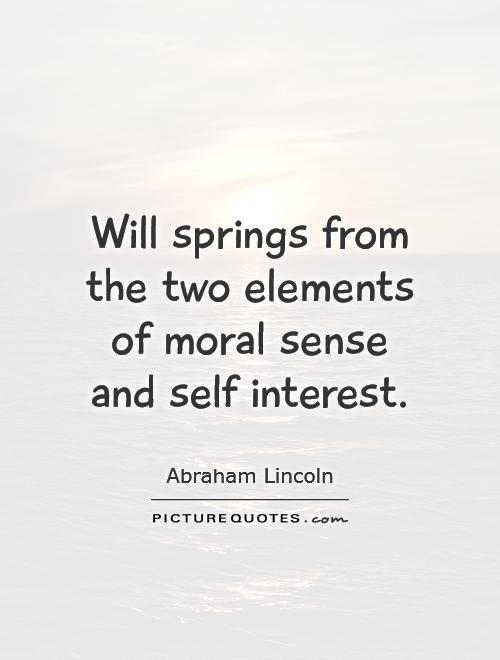Will springs from the two elements of moral sense and self interest

Will springs from the two elements of moral sense and self interest
Abraham Lincoln, the 16th President of the United States, is often regarded as one of the greatest leaders in American history. His leadership during the Civil War and his efforts to abolish slavery have solidified his place in the annals of history. One of the key aspects of Lincoln's leadership was his ability to balance moral sense and self-interest in his decision-making process.Lincoln believed that will, or the determination to achieve a goal, springs from the two elements of moral sense and self-interest. He understood that in order to lead effectively, one must have a strong moral compass and a clear understanding of one's own self-interest. Lincoln's moral sense was deeply rooted in his belief in equality and justice for all individuals. He believed that all men were created equal and that slavery was a moral evil that needed to be eradicated.
At the same time, Lincoln was also guided by self-interest in his decision-making. He understood that in order to achieve his goals of preserving the Union and abolishing slavery, he needed to navigate the complex political landscape of his time. Lincoln was a master strategist who knew how to leverage his political capital and make calculated decisions that would advance his agenda.
One of the most famous examples of Lincoln's ability to balance moral sense and self-interest was his issuance of the Emancipation Proclamation. While Lincoln personally abhorred slavery and believed it was morally wrong, he also recognized the strategic importance of freeing the slaves in order to weaken the Confederacy and bolster the Union war effort. By framing the Emancipation Proclamation as a military necessity rather than a moral imperative, Lincoln was able to achieve his goal of ending slavery while also advancing the Union cause.












 Friendship Quotes
Friendship Quotes Love Quotes
Love Quotes Life Quotes
Life Quotes Funny Quotes
Funny Quotes Motivational Quotes
Motivational Quotes Inspirational Quotes
Inspirational Quotes